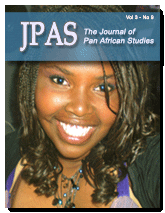CURRENT ISSUE
 Volume 3 • Number 8 • 2010
Volume 3 • Number 8 • 2010
● Introduction: The Roles and Functions of Africana Psychology
by guest editor DeReef F. Jamison
[ view PDF ]
SEEKING THE SAKHU: AFRICANA PSYCHOLOGISTS IN SEARCH OF THE SPIRIT
● Educating African-centered Psychologists: Toward a Comprehensive Paradigm
by Eyrlene Piper Mandy and Taasogle Daryl Rowe
[ view PDF ]
This article seeks to develop an African-centered meta-theoretical framework for thinking about human development and introduces a system for categorizing and codifying the domains of inquiry in the teaching of African-centered psychology.
● Zulu Traditional Healing, Afrikan Worldview and the Practice of Ubuntu: Deep Thought for African/Black Psychology
by Kevin Washington
[ view PDF ]
This paper examines the role that the Zulu traditional concept of spiritual wholeness (psychology) has played in maintaining some sense of beingness for the Zulu people throughout the apartheid era and explores how this notion can become a part of Afrikan-Centered Psychology.
● African Spiritual Methods of Healing: The Use of Candomble’ in Traumatic Response
by Chante’ D. De Loach and Marissa N. Peterson
[ view PDF ]
This article presents findings from a phenomenological study exploring the healing experiences of favela residents who utilize Candomblé as a psychospiritual intervention for traumatic response to neocolonial conditions.
AFRICANA PSYCHOLOGICAL THEORY AND INTELLECTUAL HISTORY
● Reframing Mental Health and Psychological Well-Being Among Persons of African Descent: Africana/Black Psychology Meeting the Challenges of Social and Cultural Realities
by Linda James Myers and Suzette Speight
[ view PDF ]
This essay postulates an ethical imperative underlying the theory and practice of Africana/Black Psychology, as well as, a vision for effectively meeting the challenges facing persons of African descent as they attempt to develop and maintain psychological well-being in the face of oppressive realities.
● Theories of African American Personality: Classification, Basic Constructs, and Empirical Predictions/Assessment
by Kobi K. K. Kambon and Terra Bowen
[ view PDF ]
This article emphasizes the key-central constructs of the representative African American Personality models (both core and peripheral), as well as the changes that have occurred in these models over the past quarter of a century or more since their introduction.
● A Genealogical Analysis of the Worldview Framework in African-centered Psychology
by Karanja Keita Carroll
[ view PDF ]
This essay provides a genealogical review of the developmental history and usage of worldview as it relates to producing culturally-specific theory and research consistent with the aims and goals of African-centered psychology and Africana Studies.
●Criteria that Indicate When African-centered Consciousness is Endangered or Depleted by the Mass Media
by Daudi Ajani ya Azibo
[ view PDF ]
This article formulates and promulgates criteria that indicate when the African-centered consciousness of African descent people is endangered or depleted by the mass media.
AFRICAN-CENTERED ANALYSES OF FRANTZ FANON
● Beyond Health Disparities: Examining Health Disparities and Industrial Complexes from the Views of Frantz Fanon (Part 1)
by The Fanon Project
[ view PDF ]
This paper provides a meta-theoretical model for understanding health disparities through an analysis of the military, media, health/medical, prison, academic, development, and economic industrial complexes which function as the warehouses and conduits of power disparities.
● Fanon Revisited: Exploring the Relationship between African-centered Psychology and Fanonian Psychology
by DeReef F. Jamison
[ view PDF ]
This essay demonstrates when and where the various articulations of Africana mental health expressed by African-centered Psychologists and Frantz Fanon enter into similar discourses.
● Word of Wisdom for Building to Eternity: An Interview with Linda James Myers.
by Sekhmet Ra Em Kht Maat
[ view PDF ]
An interview with Linda James Myers, a leading scholar and pioneer in the field of Africana/African-centered Psychology.



